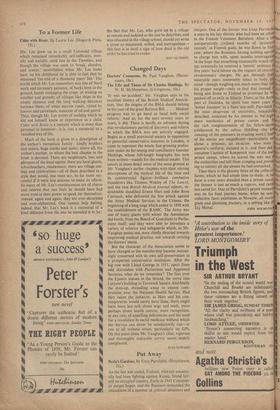Changed Days
'IT was no accident,' Mr. Vaughan says in his excellent history of the British Medical Associa- tion. 'that the origins of the BMA should belong to the year of the great Reform Bill. . . . Medical progress was to go hand in hand with social reform.' And so, for the next seventy years or more, it did. There is hardly an advance during that revolutionary period of discovery and reform in which the BMA was not actively engaged. Begun as a small provincial society in opposition to powerful conservative interests in London, it came to represent the whole fast-growing profes- sion under its far-seeing and conciliatory founder Hastings, whose full-length biography has now been written—mainly for the medical reader. This covers in more detail some of the same ground as Mr. Vaughan's earlier chapters with their stirring descriptions of the medical life of the time and its controversial figures—brilliant combative thunderers like Thomas Wakley of The Lancet, and the two British Medical Journal editors, re- doubtable dandified Ernest Hart and John Rose Cormack, who delivered the first attack against the Army Medical Services in the Crimea, the beginning of a long siege which ended in 1898 with the establishment of the RAMC. The Army was one of many giants with whom the Association did battle, from the Board of Guardians to Parlia- ment itself; and they were able to introduce a variety of reforms and safeguards which, as Mr. Vaughan points out, were chiefly directed towards improving medical practice, not towards revising the doctors' status.
But the character of the Association seems to have changed as the membership became increas- ingly concerned with its own self-preservation as a prosperous conservative institution. After the big row with Lloyd George in 1911, apart from odd skirmishes with Parliament and Approved Societies, what do we remember? The fuss over the Epstein statues in the Strand, the move into Lutyens's building in Tavistock Square. And finally the dust-up, dwindling away to uneasy com- promise, over the National Health Service. Had they taken the initiative, as Hart and his con- temporaries would surely have 'done, there might have been less talk about wigs and teeth, more perhaps about health centres; more recognition, at any rate, of appalling deficiencies and the need for a revolution in social medicine without which the Service can never be satisfactorily run—or run at all without strain, particularly on GPs. On this point alone Mr. Vaughan's clear, vigorous and thoroughly enjoyable survey seems unduly complacent.
JEAN HOWARD










































 Previous page
Previous page